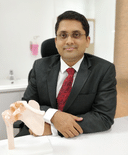Repeated Shoulder Dislocations - Know The Consequences & Treatment!
The term ‘shoulder dislocation’ actually refers to the ball of the shoulder joint losing contact with bony cup. The shoulder joint is more flexible than most of your other joints and hence most commonly dislocated.
Once a doctor brings the shoulder joint back in its place, most patients return back to daily life. However many patients experience a second episode or multiple episodes of dislocation which they neglect over a long period of time. Some of the patients or their relatives learn to put the shoulder back in its place. This neglect can lead to serious consequences
Causes: How can you acquire a dislocated shoulder?
The following situations can have you acquire a dislocated shoulder-
- If you fall from a height onto a hard surface straight on your shoulder
- Sudden forceful hit on the front area of shoulder area like in fights or sports like soccer or rugby
- Injuries sustained due to throwing actions in cricket or in overhead sports like badminton, squash, tennis etc.
- Road traffic accidents
- Sudden jerk to shoulder while holding overhead chain in train or bus.
How does repeated shoulder dislocation harm your body and functioning?
Following are the short and long-term complications that could develop from repeated dislocations of your shoulder-
- People are scared to play sports or to take the arm in the throwing position
- With increasing frequency dislocations may occur in sleep
- Some patients report decreased strength in the arm and difficulty in lifting weights
In reality with every dislocation the tissues and muscles around the shoulder become weaker and weaker leading to further problems. In addition the ball and bony cup of the shoulder get abraded with each dislocation due to friction leading to future joint problems.
Treatments: how do you manage your dislocated shoulder?
The doctor/physician will recommend the following methods for the management of a dislocated shoulder-
- Immediate consultation with an orthopaedic surgeon who will help to put the shoulder back into its position.
- Meanwhile you can support the elbow with a cloth sling and take a pain killer injection nearby.
- Ice your shoulder continuously
- Do not eat or drink anything, as anaesthesia may be required for the procedure of putting the shoulder back.
What do I do if I have already suffered repeated or multiple shoulder dislocations?
You should consult a shoulder specialist orthopaedic surgeon who will examine you. X-rays, MRI and if needed CT scans will be done. In most of the patients surgery will be required to repair the damaged tissues. In majority cases this surgery will be a keyhole surgery called arthroscopic surgery. The recovery after arthroscopic surgery is quick and allows patients to resume office work at 5-10 days. With appropriate rehab almost all patients return to normal life by 6 weeks and sportspersons can resume sports after 6 months.



+1.svg)
